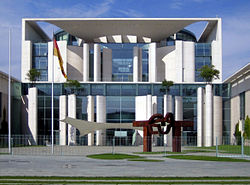| Revision as of 03:18, 16 July 2006 editFluxbot (talk | contribs)Bots27,900 edits WP:CFDS Category:Executive Branch of the German Government --> Category:Executive branch of the German Government← Previous edit | Revision as of 23:23, 11 August 2006 edit undoLeibniz (talk | contribs)2,377 editsm rearrange picsNext edit → | ||
| Line 1: | Line 1: | ||
| ⚫ | ] | ||
| ] | ] | ||
| ] | ] | ||
| Line 5: | Line 4: | ||
| ] | ] | ||
| ] | ] | ||
| ⚫ | ] | ||
| {{otheruses4||the pre-1945 equivalent|Reich Chancellery}} | {{otheruses4||the pre-1945 equivalent|Reich Chancellery}} | ||
Revision as of 23:23, 11 August 2006






The German Chancellery (in German, Bundeskanzleramt, or more commonly: Kanzleramt) is the office of the Chancellor of Germany. The head of the Chancellery (Chef des Bundeskanzleramtes) is a secretary of state or a federal minister. He coordinates the federal government (Bundesregierung) of Germany. Despite this important position in the politics of Germany, the Chancellery and its head largely work in the background and have little public attention. The current head of the Chancellery is Thomas de Maizière.
The Chancellery is also the name of the building that houses the personal offices of the Chancellor and the staff of the Chancellery. From 1949, the Chancellery along with the rest of the federal administration was situated in Bonn. The Palais Schaumburg was originally used, until the construction of the Chancellery, in 1976. In 1999, the Chancellery returned to Berlin, and to new premises. The building is a masterpiece of modern architecture. It's also one of the largest government-headquarters in the world. (12000 m², 8x White House)
Heads of the Chancellery since 1950
Directors of the Chancellery attend Cabinet meetings. They may also sit as members of the Cabinet if they are also given the position of Minister for Special Affairs, similar to that of Minister without Portfolio in some other countries.
- 1950–1951: Walter Hallstein
- 1951–1953: Otto Lenz
- 1953–1963: Hans Globke
- 1963–1966: Ludger Westrick (also Minister for Special Affairs and the Defense Council, 1964-66)
- 1966–1967: Werner Knieper
- 1967–1969: Karl Carstens
- 1969–1972: Horst Ehmke (also Minister for Special Affairs)
- 1972–1974: Horst Grabert
- 1974–1980: Manfred Schüler
- 1980–1982: Manfred Lahnstein
- 1982: Gerhard Konow
- 1982–1984: Waldemar Schreckenberger
- 1984–1989: Wolfgang Schäuble (also Minister for Special Affairs)
- 1989–1991: Rudolf Seiters (also Minister for Special Affairs)
- 1991–1998: Friedrich Bohl (also Minister for Special Affairs)
- 1998–1999: Bodo Hombach (also Minister for Special Affairs)
- 1999-2005: Frank-Walter Steinmeier
- since 2005: Thomas de Maizière (also Minister for Special Affairs)